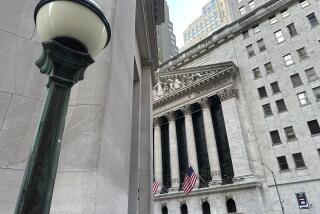Stocks Fizzle Even As Yields Hit Record Low
- Share via
U.S. stocks failed to sustain two rally attempts on Friday and closed out their fourth straight losing week, even as long-term bond yields sank to record lows.
Meanwhile, depressed Russian and Hong Kong shares rallied sharply, but analysts warned that the turmoil in those markets may be far from over.
On Wall Street an early gain in the Dow Jones industrials dwindled, and the index ended down 34.50 points, or 0.4%, at 8,425.00.
Losses in other indexes varied, with the blue-chip Standard & Poor’s 500 sinking 1.1% and the Russell 2,000 index of smaller shares easing 0.3%.
While fairly minor, the declines left traders gloomy for three primary reasons:
* Stocks did not respond to falling interest rates, as the 30-year Treasury bond yield tumbled from 5.64% on Thursday to 5.54%--a record low that surpassed the previous record of 5.57% set on June 15.
Falling interest rates usually are bullish for stocks.
* The rebound in Russia, Hong Kong, other Asian stock markets and in much of Europe failed to inspire Wall Street.
* With Friday’s losses, U.S. stocks now have slumped for four consecutive weeks. And the S&P; 500 was pushed Friday to 1,062.75, leaving it 10.4% below its record high set July 17.
*
That means the S&P; is officially in a “correction,” defined as a drop of between 10% and 20%.
The Dow’s close--its lowest since Feb. 24--left it down 912 points, or 9.8%, from its record high of 9,337.97, also set July 17.
“The ‘irrational exuberance’ is going to go away,” said James Penner, chief investment officer at the Montana Board of Investments, paraphrasing Federal Reserve Board Chairman Alan Greenspan’s famous 1996 warning about soaring stock valuations.
“I wouldn’t be a bit surprised to see further declines,” said Penner.
In the broad market rising stocks outnumbered falling stocks for much of the day, but losers took command in the final hour.
On the New York Stock Exchange losers topped winners by 17 to 13 in the final tally. Volume was active at 664 million shares.
For the week the Dow fell 2%, the S&P; 500 lost 2.5% and the Russell 2,000 gave up 3.1%.
In foreign trading Russian stocks rebounded nearly 14%, after collapsing in recent weeks, as the United States said world leaders are working to help steady Russia’s financial markets, easing concern about the nation’s ability to meet debt payments.
Hong Kong’s battered Hang Seng index, meanwhile, soared 8.5% to 7,224.69. But the buying was fueled in part by Hong Kong government money, which moved into the market in what government officials said was an attempt to thwart speculators.
That left many traders worrying that the Hong Kong rally won’t be sustained. Still, other Asian markets also rallied. But Tokyo shares ended down 1.7% to 15,124, as the yen weakened again, to 146.35 to the dollar.
*
In the U.S. bond market the plunge in yields was spurred by the continuing “flight to safety” among global investors who have been spooked by the carnage in many developing countries’ stock and bond markets in recent weeks.
“The knee-jerk response is to go to safety” when there is trouble overseas, and that’s helping bonds, said Tom Seay, who manages about $400 million at Gradison-McDonald Asset Management in Cincinnati.
The weak U.S. industrial production report for July also encouraged bond buyers to believe that the domestic economy is continuing to slow.
What’s more, with President Clinton testifying Monday in the Monica Lewinsky case, some investors were unwilling to hold anything but the “safest” securities over the weekend.
For Wall Street, ongoing worries about Clinton, Russia, Asia and weak corporate profits could well trigger more selling in coming weeks, analysts warn.
But David Rolfe, chief investment officer for Wedgewood Partners, took a positive view: “The market has [already] digested a lot of bad news. . . . People should be buying, not selling.”
Among Friday’s highlights:
* The Dow would have been weaker if not for J.P. Morgan, which soared $9.63 to $126.88 after Business Week magazine reported that the Wall Street investment firm is discussing a merger with a major European bank.
* On the downside, Ciena plunged $17.06 to $54.13 after the telecom equipment supplier warned that third-quarter profit will be less than half of expectations. Competition from Lucent Technologies is forcing Ciena to cut prices, analysts said. The news could jeopardize Ciena’s pending acquisition by Tellabs, which slumped $13.69 to $58.13.
Lucent fell $2.19 to $85.88.
* Major chemical issues fell after DuPont’s warning this week of weaker earnings. DuPont lost $1.75 to $53.25, Dow Chemical fell $4.63 to $85.50 and Rohm & Haas dropped $4.50 to $90.
* Among new stock issues, Global Crossing, a planned trans-ocean fiber optic network, soared $6.50 to $25.50 on its first day of trading. Also, Media jumped $6.25 to $20.25. The firm runs advertising networks for independent Internet sites.
Market Roundup, D4
More to Read
Inside the business of entertainment
The Wide Shot brings you news, analysis and insights on everything from streaming wars to production — and what it all means for the future.
You may occasionally receive promotional content from the Los Angeles Times.










